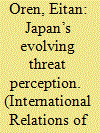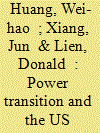|
|
|
Sort Order |
|
|
|
Items / Page
|
|
|
|
|
|
|
| Srl | Item |
| 1 |
ID:
174856


|
|
|
|
|
| Summary/Abstract |
After a decade of vibrant scholarly and political discourse regarding the prospects of East Asian integration, the narrative of regionalism has lost its luster in favor of a darker regional narrative. Has the idea of East Asian regionalism come to pass, and if so, what explains the decline in the narrative of Asian regionalism both as a policy idea and as a research program? After providing empirical evidence tracking the rise and decline in scholarly publications and news articles regarding Asian regionalism, I present several plausible reasons explaining this decline. Among them, the perceived shift in Chinese strategic behavior, and in turn, the adoption of more pragmatic interpretations of Asian security practices – one defined by power balancing and institutional rivalry rather than community building – appears to have struck a major blow to the East Asia regional project.
|
|
|
|
|
|
|
|
|
|
|
|
|
|
|
|
| 2 |
ID:
174857


|
|
|
|
|
| Summary/Abstract |
Scholars have recently commented on Japan’s increasing threat perception, either in the context of an ‘increasingly complex security environment’, or in the context of its use by Japanese elites to advance their political goals. Yet, while references to Japan’s threat perception are ubiquitous, conceptual clarity and comprehensive empirical evidence are far less so. This article seeks to address these gaps by conducting a longitudinal study of threat perception in postwar Japan. Data are driven from content analysis of debates in Japan’s national parliament over a period of seven decades (1946–2017). The evolution of Japan’s threat perception is analyzed, and a revisionist account of Japan’s threat perception is put forward. Thus, this study serves both as a metric of threat perception in postwar Japan and as a model for the study of threat perception in international relations.
|
|
|
|
|
|
|
|
|
|
|
|
|
|
|
|
| 3 |
ID:
174855


|
|
|
|
|
| Summary/Abstract |
Can positive domestic messages generated by a foreign policy of engagement toward another country change public views regarding that state? How resistant are such changes to events that contradict the positive messages? I argue that while positive government messages about an adversary can significantly improve public opinion, highly consequential foreign policy events that contradict the messages influence public opinion at the cost of elites’ ability to shape it through their messages. Such differing effects can lead to a polarization of opinion when the content of the messages and the nature of events diverge from each other. Leveraging the unpredictability of North Korea’s foreign policy behavior, the South Korean government’s sustained policy of engagement toward it during the years 1998–2007, and North Korea’s first two nuclear tests to examine the relative impact of consequential foreign policy events and elite messages on public opinion, I find strong evidence consistent with this argument.
|
|
|
|
|
|
|
|
|
|
|
|
|
|
|
|
| 4 |
ID:
174854


|
|
|
|
|
| Summary/Abstract |
Many scholars have examined how the United States should respond to a rising non-democratic China. Contrary to the well-debated hard power domain, little attention has been devoted to China’s soft power. This study is arguably the first to systematically investigate the US response to the establishment of Confucius Institutes—China’s global initiative to expand soft power. We argue that the US decision to establish Confucius Institutes is influenced by both macro- and micro-level variables. At the macro-level, as suggested by the power transition theory, the United States is more likely to accommodate Confucius Institutes when China shows a higher level of satisfaction with the United States. At the micro-level, US universities and state governments host Confucius Institutes due to budget saving and community engaging. Our analysis sheds light on how the United States makes trade-offs when confronting China’s expanded soft power, and it provides yet another prominent example of money buying influence in international relations.
|
|
|
|
|
|
|
|
|
|
|
|
|
|
|
|
| 5 |
ID:
174853


|
|
|
|
|
| Summary/Abstract |
This article empirically examines various factors affecting the formation of China’s bilateral investment treaties (BITs) since 1978. Using a panel data analysis, this article finds that domestic and foreign relationship as well as foreign country and global factors, help explain the signing of BITs. Specifically, China’s trade openness and economic growth, foreign countries’ level of democracy, and socialization are positively related to the signing of BITs, while foreign economic growth and the distance between two countries are negatively related to the signing of BITs. Generally, this article finds that China signs BITs mainly to attract foreign capital, signaling to foreign investors that it protects their rights in China. Meanwhile, China has been less likely to sign BITs with countries with which it enjoys favorable bargaining position. As this article finds, China is more likely to sign BITs with democratic countries, suggesting that global spread of democracy spread globalization.
|
|
|
|
|
|
|
|
|
|
|
|
|
|
|
|
|
|
|
|
|